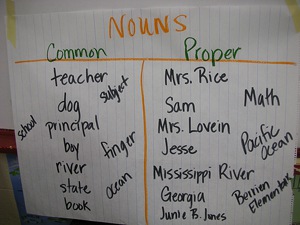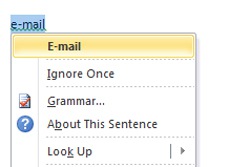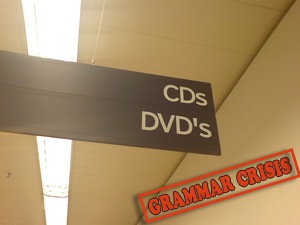The Internet has radically changed global communication. Writing (and typing) has become more casual, information exchange has become faster, and grammar errors have become more acceptable.
Whether the Internet is going to change the long-term grammar is not the issue. The issue is how we treat the grammar errors now. And we really treat them differently now: we don’t even notice them most of the time.
However grammar is important, especially when it comes to the corporate blog and the brand image. I am not going to try to list all common grammar mistakes we see online now (that would make an insanely huge post). Instead, I am going to tackle one of the most interesting grammar aspects: capitalization and how it is being misused.
 1. Capitalizing Proper Names
1. Capitalizing Proper Names
Despite it being quite an easy and well-known rule, it is often neglected. Proper names get capitalized (here’s a good list of them).
Most common mistakes here include site names like Facebook and Twitter (even if they are mentioned so often everywhere that they already sound like common names already).
Note: this rule can be ignored when it comes to eponyms (which are words derived from proper nouns). In our case (since this article focuses on the Internet realia) the popular example is “to tweet” or even “to twitter” which means “share on Twitter.”
Capitalizing the Internet, the Web and the Net
 The need to capitalize these three words derived from the need to distinct them from generic internets (or internetworks). In its generic sense, internet is a common noun, a synonym for internetwork; therefore, it has a plural form and is not capitalized. In its specific sense, it is a proper noun, and therefore, without a plural form and traditionally capitalized. Most well-known text editors (including Microsoft Word) automatically capitalize the lowercase ”i” or mark “internet” as mistake.
The need to capitalize these three words derived from the need to distinct them from generic internets (or internetworks). In its generic sense, internet is a common noun, a synonym for internetwork; therefore, it has a plural form and is not capitalized. In its specific sense, it is a proper noun, and therefore, without a plural form and traditionally capitalized. Most well-known text editors (including Microsoft Word) automatically capitalize the lowercase ”i” or mark “internet” as mistake.
In 2002 there was a huge attempt to change Internet from a proper noun to a generic term.
”The capitalization of things seems to place an inordinate, almost private emphasis on something. ‘The Internet, at least philosophically, should not be owned by anyone [because it is] ‘part of the neural universe of life.”
Later another powerful Internet resource Wired followed the pattern:
If It’s Capitalized, It Must Be Important. In German, where all nouns are capitalized, it makes sense. It makes no sense in English. So until we become Die Wired Nachrichten, we’ll just follow customary English-language usage. (Web will continue to be capitalized when part of the more official entity, World Wide Web.)
Naturally, as part of a company name or organization — the Internet Movie Database, for example — the “I” remains capitalized. It also remains capped in headlines, where Wired News style decrees that all principal words are capitalized.
(Yet, some of the commenters note that the magazine is not sticking to that policy too religiously).
E- / e- (short for “electronic”) words: How Do You Spell Those?
 In almost all cases where the e is short for the word electronic, there is some confusion as to whether to capitalize and hyphenate the words:
In almost all cases where the e is short for the word electronic, there is some confusion as to whether to capitalize and hyphenate the words:
e-mail or E-mail or email
e-commerce or E-commerce or ecommerce
e-day or E-day or eday
e-business or E-business or ebusiness
e-learning or E-learning or elearning
Capitalizing the initial letter E is done in the same way as X-ray, T-shirt, A-bomb, H-bomb. However most (not all) of these are very specific words which use their initial letter for its shape rather than any specific meaning.
Here’s a good article that explains the proper usage of those words. E-words are no proper nouns, so there’s no reason to capitalize them. The hyphen is not necessary as well:
The hyphen doesn’t come packed into all words by default. It’s used specifically where it’s needed to aid comprehension. When it’s no longer required it can be removed
Therefore there is no reason to capitalize or hyphenate those e-words.
 2. Capitalizing Article Titles
2. Capitalizing Article Titles
Article titles and subheadings are normally capitalized not (only) because that makes them stand out. They should be capitalized because English Grammar demands so. But do you know how to capitalize? I notice a lot of confusion around the web as to which words in headings should be capitalized and which shouldn’t.
Long ago we had an awesome, very in-depth and very useful article on Title Capitalization in the English Language that deserves to be brought up again. It gives you a very clear guidelines to follow to capitalize blog post titles without breaking any rules.
blog posts or articles, the standard rule in the English language is to capitalize words that:
1. Are the first or the last word in the title
2.
Are not conjunctions (“and”, “but”, “or”, “nor”), adpositions (“to”, “over”), articles (“an”, “a”, “the”), or the “to” in infinitives.
Note: of course if you are using text-transform: capitalize style for your headings, you won;t be able to follow the rule because it capitalized every word.
 3. Capitalizing Abbreviations
3. Capitalizing Abbreviations
(and using them in plural)
An acronym is a word formed by the
first, or first few, letters of words in a long name of an
organization. Most acronyms are usually capitalized and it’s a well-known rule.
Where it gets tricky (and often misused) is making plural out of acronyms. Browsing the web you often notice plural acronyms used with the apostrophe: “PDF’s”, “SERP’s,” etc.
The truth is, that’s incorrect.
To form the plural of an abbreviation (acronyms, intialisms, truncations), simply add a lowercase s to the end.
PDFs, SERPs, etc
There is a tiny exception here that there’s an option of using an apostrophe to form the plural only if that assists readability: for example if there are two consecutive s in the word: SOS’s or the apostrophe helps to understand the meaning: “There are two e’s in expression”.
Post images by dickdotcom, louisahennessyvikinghorns, Old Shoe Woman
Check out the SEO Tools guide at Search Engine Journal.
HOW TO: Capitalize When Writing for the Web (Blogging Grammar Lessons)




